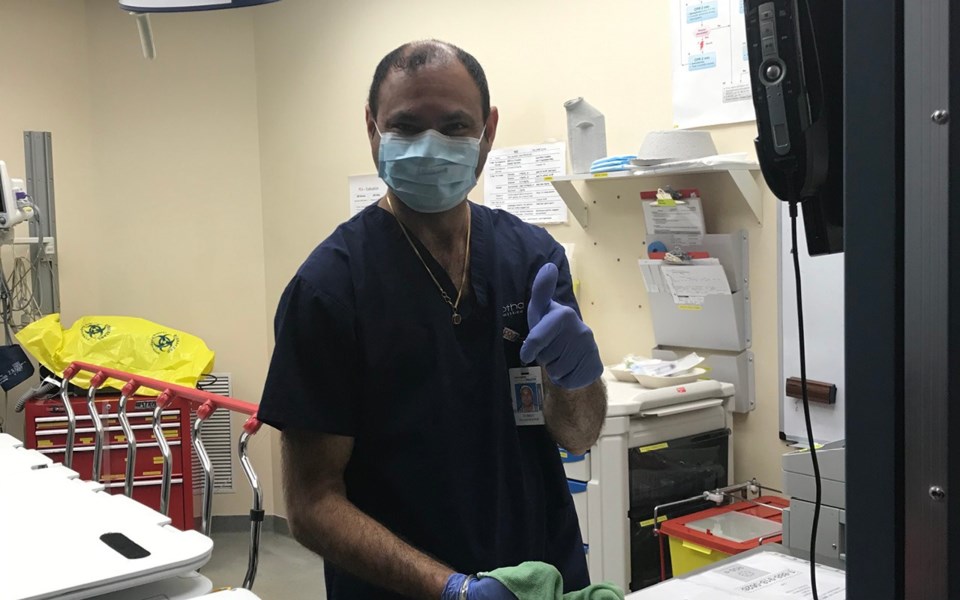As local medical personnel brace for a possible surge in COVID-19 cases, Whistlerites are being urged to stay the course on physical distancing and other protective measures.
"We haven't experienced a surge yet, but the advice from public health [officials] is that it still could occur in the weeks to come, so we have to continue to be vigilant," advised Dr. Bruce Mohr, medical director for the Whistler Health Care Centre (WHCC).
"B.C.'s curve appears to have levelled for the time being but we still don't know if or when it might go up again, or how long it will be before it goes down. We also do not know if this reflects Whistler's curve. It is still early."
Personnel at the WHCC as well as at the Whistler Medical Centre, located in the same facility, have been carrying out "robust planning" to manage both emergency and urgent care, explained Dr. Karin Kausky, but "the behaviour of individuals will have a much bigger impact on the health of our community than all of our planning."
Local doctors are also hopeful the same message reaches anyone thinking of visiting the resort over the upcoming Easter holiday.
"Small communities do all their capacity planning based on their base populations, and the capacity of all essential services, including medical, can be exceeded if there are large numbers of visitors—and B.C.'s medical health officer has asked us to avoid all non-essential travel because that is a way of spreading the virus as well," Kausky stressed.
A second ventilator has been acquired at the WHCC for patient transport. Without an intensive care unit, the WHCC is not equipped to keep patients requiring higher levels of care, instead relocating them to tertiary care hospitals in the the Lower Mainland.
"We are not in the business of housing patients on ventilators here," Mohr noted.
Patients should continue to avoid the WHCC unless they feel the problem is urgent or they cannot get advice or care elsewhere. If possible, urgent care patients should call the centre at 604-932-4911 before visiting the ER.
"There are reports of people in the Lower Mainland showing up late to emergency with heart attack, stroke, and other conditions where timely care is crucial," Mohr noted.
For non-urgent issues, patients are asked to contact their family physician or specialist as they normally would to arrange an appointment by phone or teleconference.
Those without a family doctor can still consult a GP remotely through a virtual clinic set up last month at www.divisionbc.ca/sea-sky.
Canada's 811 healthline is also available for COVID-19 self-assessments as well as other medical advice and information.
Clearing up confusion around symptoms
The avalanche of messaging since the COVID-19 outbreak has made it challenging to keep track of even the most vital information on the virus.
We've all heard of the most common novel coronavirus symptoms: fever, dry cough, shortness of breath, and other flu-like symptoms, such as muscle ache and fatigue. Others may have mild cold-like symptoms, such as a sore throat or runny nose. Less common symptoms include diarrhea, and in some cases, the loss of taste or smell.
And while we know those infected can go about two to five days before presenting symptoms, there are also those who may never develop symptoms at all—which so far appears to be more common among younger patients, Kausky explained.
"It seems that younger people are more likely to be asymptomatic shedders, so in our relatively younger population, that's where the ... use of masks comes up in the community," she added.
The mask question
Initially, Canadian health officials were concerned over the potential for non-medical masks, such as homemade cloth masks, being misused and giving wearers a false sense of security. But with the transmission of the virus from those who show no symptoms happening more often than previously thought, that message has shifted.
Wearing a non-medical mask has not been proven to protect the person wearing it, but it could help protect those around you.
"If everyone starts wearing the masks, then we protect each other," said Mohr.
Those who choose to wear non-medical masks or face coverings should ensure it is well-fitted and does not gape at the sides. Wearers should avoid moving or adjusting their mask, and, after finished wearing it, should assume it has been contaminated on the outside and either dispose of it or wash it for reuse. Wash your hands before and after putting it on, as well as before and after taking it off.
Vancouver Coastal Health has a webpage outlining what supplies it accepts, what standards they have to meet, and a form to fill out for anyone looking to donate equipment at vch.ca/get-involved/donate/donate-medical-supplies.




